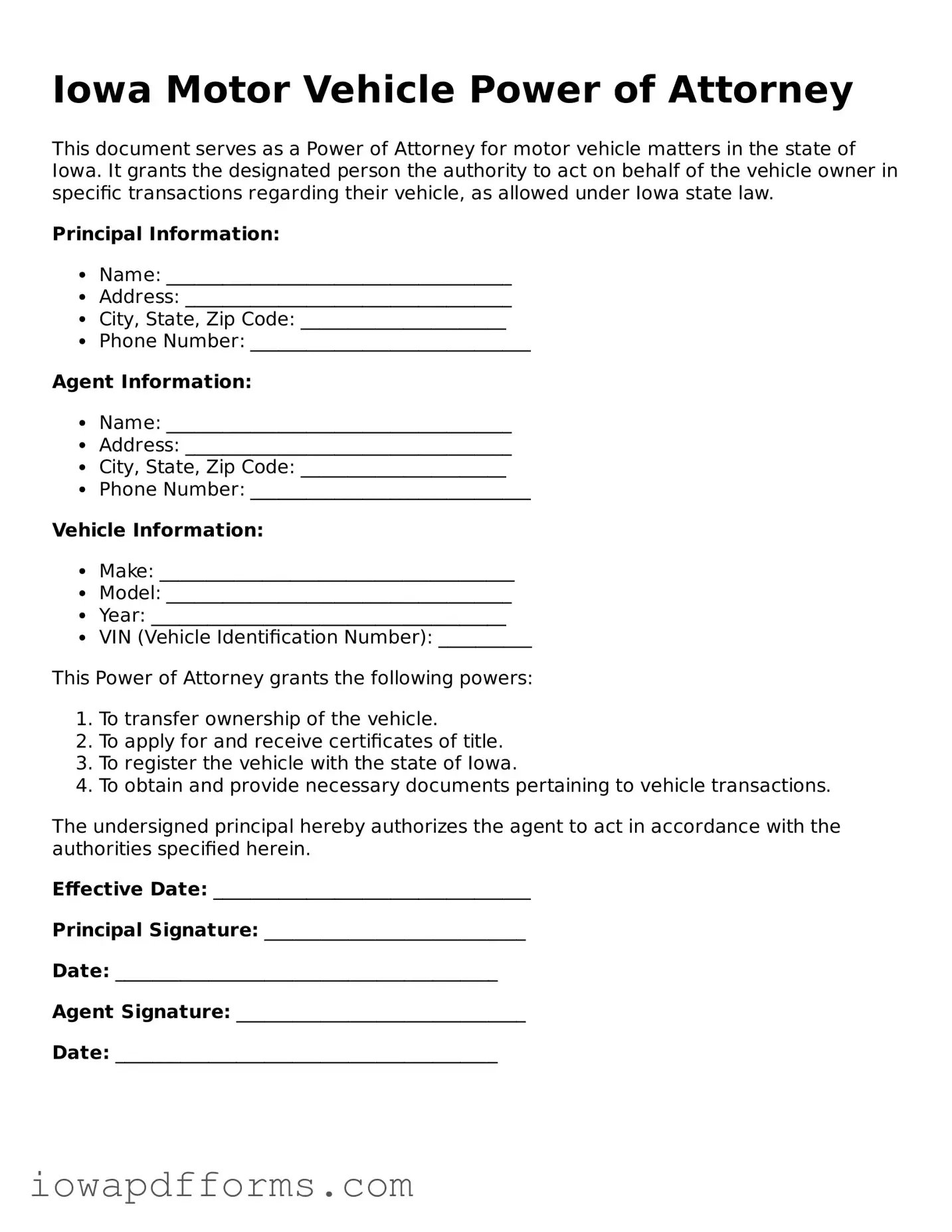The Iowa Motor Vehicle Power of Attorney form shares similarities with the General Power of Attorney. Both documents allow one individual to act on behalf of another in various matters. In the case of the General Power of Attorney, the authority granted can encompass a wide range of financial and legal decisions, not limited to motor vehicle transactions. This broader scope makes it a versatile tool for individuals who want to ensure that someone they trust can handle their affairs in their absence or incapacitation.
Another document akin to the Iowa Motor Vehicle Power of Attorney is the Durable Power of Attorney. This form is particularly useful because it remains effective even if the person granting the authority becomes incapacitated. Like the Motor Vehicle Power of Attorney, it allows the designated agent to make decisions and take actions on behalf of the principal. The key distinction lies in its durability, which ensures that the agent can continue to manage affairs when the principal can no longer do so themselves.
The Health Care Power of Attorney is another document that shares a common purpose with the Iowa Motor Vehicle Power of Attorney, albeit in a different context. While the Motor Vehicle Power of Attorney focuses on vehicle-related matters, the Health Care Power of Attorney allows an individual to designate someone to make medical decisions on their behalf if they are unable to communicate their wishes. Both documents empower a trusted individual to act, ensuring that the principal's preferences are respected in critical situations.
Additionally, the Limited Power of Attorney is similar in that it grants specific, restricted powers to an agent. This document can be tailored to address particular tasks, such as handling the sale of a vehicle, which aligns closely with the focus of the Iowa Motor Vehicle Power of Attorney. The key difference is that the Limited Power of Attorney is not confined to motor vehicle matters; it can be used for any designated purpose, making it a flexible option for those who need to delegate authority for specific tasks.
When engaging in the sale of a vehicle, it is crucial to have the necessary documentation in order. One essential form that every seller should consider is the Motor Vehicle Bill of Sale form, which provides a clear record of the transaction and protects both parties involved by detailing the terms of the sale and confirming the transfer of ownership.
Furthermore, the Financial Power of Attorney is comparable in that it allows an individual to appoint someone to manage their financial affairs. This document can cover a broad range of financial responsibilities, including managing bank accounts, investments, and real estate transactions. While the Iowa Motor Vehicle Power of Attorney is specifically tailored to vehicle-related issues, the Financial Power of Attorney encompasses a wider array of financial matters, providing a comprehensive solution for those looking to delegate authority in their financial dealings.
Lastly, the Revocable Living Trust document shares some characteristics with the Iowa Motor Vehicle Power of Attorney. A Revocable Living Trust allows individuals to place their assets into a trust during their lifetime, with the ability to modify or revoke it as needed. While the Motor Vehicle Power of Attorney specifically addresses vehicle transactions, both documents facilitate the management of assets and ensure that the principal's wishes are carried out. The main difference lies in the structure and purpose, with the trust focusing more on estate planning and asset management.

